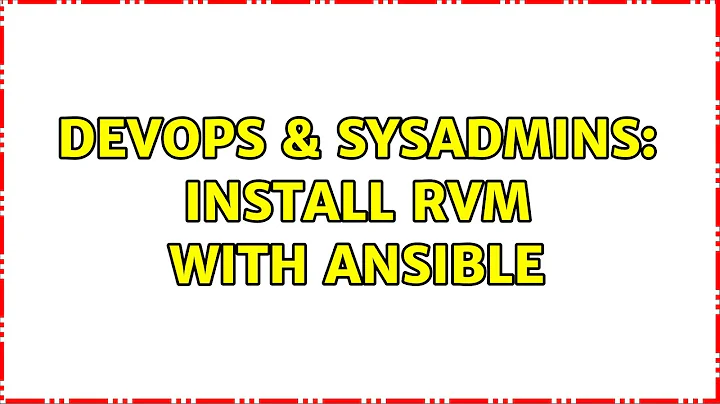Install RVM with ansible
Solution 1
RVM & Ruby Installation Playbook
Here's an idempotent playbook that will install RVM, a specific version of Ruby (set the version with the ruby_version var) and set that version of Ruby to be the default:
---
- hosts: all
sudo: yes
vars:
ruby_version: "2.1.3"
rvm_path: "/usr/local/rvm/gems/ruby-{{ ruby_version }}/bin:/usr/local/rvm/gems/ruby-{{ ruby_version }}@global/bin:/usr/local/rvm/rubies/ruby-{{ ruby_version }}/bin:/usr/local/rvm/bin"
tasks:
- name: append rvm path to environment
lineinfile: dest=/etc/environment state=present backrefs=yes regexp='PATH=(["]*)((?!.*?{{rvm_path}}).*?)(["]*)$' line="PATH=\1\2:{{rvm_path}}\3"
- name: ensure necessary packages are installed
yum:
name: "{{ item }}"
state: present
with_items:
- curl
- gnupg2
- name: ensure that GPG key for RVM is installed
command: gpg2 --keyserver hkp://keys.gnupg.net --recv-keys D39DC0E3
args:
creates: /root/.gnupg/secring.gpg
- name: ensure that RVM is installed
shell: curl -L get.rvm.io | bash -s stable
args:
creates: /usr/local/rvm
- name: ensure that ruby is installed
command: "rvm install {{ ruby_version }}"
args:
creates: "/usr/local/rvm/gems/ruby-{{ ruby_version }}"
environment:
PATH: "{{ rvm_path }}:{{ ansible_env.PATH }}"
- name: set default version of ruby with rvm
command: "rvm alias create default ruby-{{ ruby_version }}"
args:
creates: /usr/local/rvm/config/alias
environment:
PATH: "{{ rvm_path }}:{{ ansible_env.PATH }}"
Solution 2
This worked for me (Ubuntu):
tasks:
- name: Install RVM
shell: "curl -sSL https://get.rvm.io | bash"
Using a regular (non-root) user.
Solution 3
These days, I believe the recommended way is with RVM's ansible role. There are instructions in that project's README.
Solution 4
Building on @dynex's answer, here's a way to do it a bit more idempotently, by checking for a folder it would normally create.
- stat: path=/etc/profile.d/rvm.sh
register: rvm_folder
- name: install rvm
shell: "curl -sSL https://get.rvm.io | bash"
when: rvm_folder.stat.isdir is not defined
Solution 5
I also tried installing RVM with Ansible. Unfortunately RVM doesn't play nicely with non-interactive shells, because it is a shell script function. I ended up installing rbenv instead (https://github.com/sstephenson/rbenv).
Here is my gist:
Related videos on Youtube
Toby Hede
Updated on September 18, 2022Comments
-
Toby Hede over 1 year
I am attempting to install rvm with ansible on a centos-based vagrant box.
The command I am running is:
vars: user: "foo" - name: install rvm action: command sudo -u $user bash /home/$user/rvm-install.sh stable creates=$home/.rvmIt pretty much works BUT Ansible thinks it has failed.
Ansible output is:
failed: [127.0.0.1] => {"changed": true, "cmd": ["sudo", "-u", "foo", "bash", "/home/foo/rvm-install.sh", "stable"], "delta": "0:00:21.102322", "end": "2012-10-09 12:33:19.917874", "rc": 1, "start": "2012-10-09 12:32:58.815552"} stderr: % Total % Received % Xferd Average Speed Time Time Time Current Dload Upload Total Spent Left Speed 100 1081k 100 1081k 0 0 54170 0 0:00:20 0:00:20 --:--:-- 89264 stdout: Downloading RVM from wayneeseguin branch stable Installing RVM to /home/foo/.rvm/ RVM PATH line found in /home/foo/.bashrc /home/foo/.zshenv. RVM sourcing line found in /home/foo/.bash_profile /home/foo/.zprofile. # RVM: Shell scripts enabling management of multiple ruby environments. # RTFM: https://rvm.io/ # HELP: http://webchat.freenode.net/?channels=rvm (#rvm on irc.freenode.net) # Cheatsheet: http://cheat.errtheblog.com/s/rvm/ # Screencast: http://screencasts.org/episodes/how-to-use-rvm # In case of any issues read output of 'rvm requirements' and/or 'rvm notes' Installation of RVM in /home/foo/.rvm/ is almost complete: * To start using RVM you need to run `source /home/foo/.rvm/scripts/rvm` in all your open shell windows, in rare cases you need to reopen all shell windows. # root, # # Thank you for using RVM! # I sincerely hope that RVM helps to make your life easier and more enjoyable!!! # # ~Wayne -
dynex over 10 yearsYeah took me a while, but got it to work (non-global, single user). Here's the gist and the blog: gist.github.com/ihassin/7968406. Blog at ihassin.wordpress.com/2013/12/15/…
-
 Tony over 10 yearsthat gist and blog post don't use this and don't use RVM. It says that's intended for a later post.
Tony over 10 yearsthat gist and blog post don't use this and don't use RVM. It says that's intended for a later post. -
dynex over 10 yearsI'm sorry, you'r right - I changed the blog not to use RVM and wanted to do a separate write up for RVM. When I was testing with RVM, the above worked, but not "system-wide" for which you need "shell: "curl -sSL get.rvm.io | sudo bash". Sorry for the confusion and I will remove the link to the gist.
-
dynex over 10 yearsNice :) Ansible is full of hidden gems. Pun intended...
-
 anquegi over 8 yearsThanks for this solution, it works for me, but I cannot install gems from the ansible playbook, it always give me an error. How can I install gems to a gemset from ansible playbook
anquegi over 8 yearsThanks for this solution, it works for me, but I cannot install gems from the ansible playbook, it always give me an error. How can I install gems to a gemset from ansible playbook




